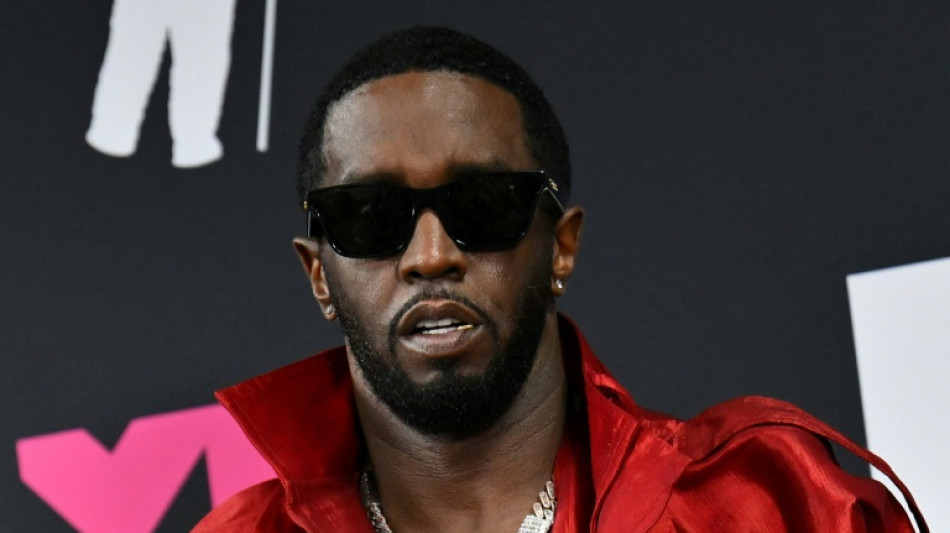

Sean Combs trial: Takeaways from testimony
Both parties have rested in the trial of Sean "Diddy" Combs, and now lawyers will address jurors directly with marathon closing arguments.
Music mogul Combs, 55, faces federal charges of racketeering, sex trafficking, and transportation with intent of prostitution. He denies all charges and faces life in prison if convicted.
As the final stages of the at-times tumultuous proceedings approach, here are takeaways from the Manhattan trial.
- Key testimony from victims -
Throughout the prosecution's nearly seven-week case, three women took the stand to describe harrowing details of graphic sexual assault, including rape.
The first was Casandra Ventura, the singer who dated Combs for 11 years. She made her dramatic turn as a star witness last month while eight months pregnant with her third child.
She recounted degrading, drug-fueled, frequently filmed sex parties with escorts she said Combs coerced her into, and also told jurors he raped her near the end of their relationship.
Jurors have repeatedly watched disturbing surveillance footage of Combs brutally beating and dragging Ventura, a video already seared into the public consciousness after CNN published it last year.
A former assistant of Combs testified under the name Mia, and described trying to protect Ventura from Combs's fits of rage. Mia told jurors she personally endured abuse, including rape, from Combs.
A third woman, Jane, also testified of orchestrated sex parties with paid escorts. She said she felt "obligated" to acquiesce to Combs's desires, for "fear of losing the roof over my head" that he was bankrolling.
- Bad Boy Entertainment or criminal enterprise? -
Prosecutors say Combs headed a criminal organization that enforced his power with myriad crimes including forced labor, kidnapping, bribery, witness tampering and arson.
The Racketeer Influenced and Corrupt Organizations Act, known by its acronym RICO, encompasses 35 specific offenses, including the aforementioned crimes. Prosecutors must prove a criminal pattern involving at least two of them.
Government attorneys, who must also show the existence of an enterprise, say Combs's sprawling music, fashion and business empire doubled as a criminal ring that included some high-ranking associates and other employees.
Through testimony and evidence, prosecutors have suggested that Combs's chief of staff and his head of security were both key to the alleged enterprise -- but neither were called to the stand, nor have they been charged publicly.
Many witnesses, including former assistants, were given immunity orders so they could speak truthfully without fear of incriminating themselves.
- The digital footprint -
Records of private messages have played a major role in the prosecution's case, a reflection of the paper trail that accompanies society's dependence on digital communication.
The government's evidence included thousands of pages of phone and text records, and hours of testimony involved meticulous readings of some of the most explicit and wrenching exchanges.
Combs's relationship with Ventura lasted from around 2007-2018, and records included many texts as well as e-mails. The testimony of Jane, a girlfriend of Combs from 2021-2024, was grounded in voluminous text conversations as well as audio voice messages and diaristic entries into her Notes app.
Many of those records appear to indicate distress on the part of the alleged victims. But a lot of the messages also show affection and desire -- texts the defense underscored again and again.
Jurors have seen video evidence of the sex parties prosecutors say were criminal, while the defense has exhibited exchanges they said imply consent.
Also in evidence are reams of financial records -- including CashApp payments to escorts -- as well as flight and hotel records.
- Coercion versus consent -
Core to the prosecution's case is a question of coercion versus consent: were the alleged victims in the case coerced, forced or fraudently made to engage in drug-addled sex marathons under threat of harm -- or were they knowing and willing participants?
In its opening statements, the defense said Combs's accusers are "capable, strong adult women."
"Being a willing participant in your own sex life is not sex trafficking," said lawyer Teny Geragos.
Ventura and Jane both said they experienced emotional manipulation and threats that were reputational, financial and physical.
And a forensic psychologist explained to jurors how the tactics of abusers can keep victims from leaving relationships.
- Celebrities, influencers and the online gossip machine -
Jurors are instructed every day not to consume media about the case -- a mighty task, as news of the trial has permeated media ecosystems and social platforms.
Dozens of news organizations are covering the trial, along with enthusiastic content creators cashing in on the internet's desire for hot takes and celebrity gossip.
Combs is incarcerated and does not enter or exit the courthouse publicly. But some of the high-profile attendees and witnesses do, including members of the music mogul's family and figures like Kid Cudi, the rapper who testified that Combs's entourage torched his car.
And the brief cameo of Ye, who stopped by to lend his "support" to Combs, was a particular field day for the chronically online.
F.Gentile--GdR



